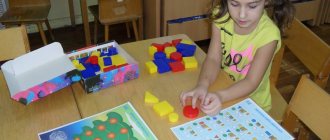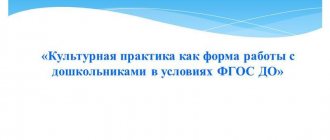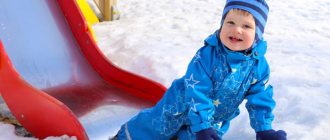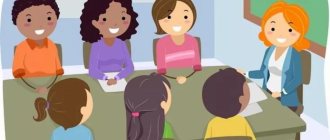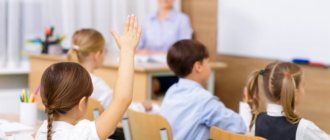FEATURES OF THE ORGANIZATION OF THE EDUCATIONAL PROCESS IN DOST article on the topic
This paper examines how the educational process is carried out in a preschool educational institution, its models and planning of the educational process in accordance with the Federal State Educational Standard for Preschool Education.
Preschool education is a holistic process aimed at: ensuring the versatile development of a preschool child in accordance with his inclinations, inclinations, abilities, individual, mental and physical characteristics, and cultural needs; the formation of moral standards in a preschool child, his acquisition of life social experience.
The introduction of the Federal State Educational Standard is due to the fact that there is a need to standardize the content of preschool education in order to provide every child with an equal starting opportunity for successful schooling.
The specificity of preschool age is such that the achievements of preschool children are determined not by the sum of specific knowledge, abilities and skills, but by the totality of personal qualities that ensure the child’s psychological readiness for school.
We consider the educational process today as a systemic, holistic one, developing over time and within a certain system, a purposeful process of interaction between adults and children, which is personality-oriented in nature, aimed at achieving socially significant results, designed to lead to the transformation of the personal properties and qualities of students. The educational process provides each individual with the opportunity to satisfy their development needs, develop their potential abilities, preserve their individuality, and the opportunity to self-realize.
The teacher’s task is to plan the educational process in such a way that, together with the student, they can fully experience all its stages: preparation, conduct, discussion of the results. At the same time, it is important that the child has positive emotional experiences and memories. At the same time, in joint activities with the teacher, the student takes a step forward in his development.
The main feature of the organization of the educational process in preschool educational institutions at the present stage is the departure from educational activities, increasing the status of play as the main activity of preschool children; inclusion in the process of effective forms of work with children: ICT, project activities, gaming, problem-based learning situations as part of the integration of educational areas.
At the present stage, the entire education system, including the pedagogical process, is acquiring new qualitative characteristics and changes. The pedagogical process is one of the fundamental categories of pedagogical science. To determine approaches to solving the problem of developing the success of a preschooler in the pedagogical process of a preschool educational institution, it is important to determine the essence of the pedagogical process of a modern preschool educational institution.
The term “pedagogical process” was introduced into pedagogy by P. F. Kapterev, the scientist considered the pedagogical process as an integral phenomenon. The problems of studying the pedagogical process were characterized in the works of P. F. Kapterev, N. K. Krupskaya, A. P. Pinkevich [1, p. 102].
In science, there are many definitions of the concept of “pedagogical process”. The concept of “pedagogical process” is used in a broad and narrow sense. In a broad sense, the pedagogical process is understood as the totality of all conditions, means, methods aimed at solving one, global problem [2, p. 173].
Thus, the pedagogical process in a preschool institution is aimed at the comprehensive education and development of the child. In a narrow sense, the pedagogical process is the concentration of the content of teaching, its means, forms, methods of organization on some more specific task [2, p. 173].
Let us consider the definitions of the concept of “pedagogical process” in the works of scientists.
B. T. Likhachev considers the pedagogical process as a purposeful, content-rich and organizationally formalized interaction of the pedagogical activities of adults and children. In his opinion, the pedagogical process is a certain system, the components of which are content, means, methods, forms of interaction between the teacher and the students [3, p. 102].
M.A. Danilov understands the pedagogical process as an internally connected set of many processes, the essence of which is that social experience turns into the qualities of the person being formed. The teacher believes that the pedagogical process is not a mechanical combination of the processes of education, training, development, but a new high-quality education, subject to its own special laws [4, p. 67].
G.M. Kojaspirova defines the pedagogical process as a holistic educational process in the unity and interrelation of education and training, which is characterized by joint activity, cooperation, co-creation of its subjects, mediated by cultural content and methods of mastering culture and its creation, contributing to the fullest development and self-realization of the individual [5, With. 56].
According to the definition of Yu.K. Babansky, the pedagogical process is “a process that realizes the goals of education and upbringing in the conditions of pedagogical systems in which educators and the educated interact in an organized manner: educational, educational, vocational educational institutions, children's associations and organizations” [6, p. 38].
Sh. A. Amonashvili characterized the pedagogical process as helping a child achieve more than he could achieve on his own, outside of this process. In the pedagogical process, the teacher (educator) performs the function of a mediator. The mediation of the teacher (educator) is to help the child intensify his efforts and thus elevate him to the educational material [7, p. 38-39].
So, having studied the definitions of the pedagogical process, we found out that the pedagogical process is helping the child (Sh. A. Amonashvili), it is the interaction of the teacher and the pupils (Yu. K. Babansky), it is a set of processes (M. A. Danilov), it is a holistic educational process in the unity and interrelation of education and training (G. M. Kodzhaspirova), this is a certain system, the components of which are contents, means, methods, forms of interaction between the teacher and the students (B. T. Likhachev).
Researchers identify various stages in the development of pedagogical processes. Thus, I. P. Podlasy highlights:
- preparatory;
- basic;
- final [2, p. 173].
Let's go into detail at each stage.
At the first preparatory stage of the pedagogical process, the goal and specific tasks are determined, methods of influence are planned and selected, taking into account the main task, the age of the children and the concept of education at the present stage, this is the concept of a personality-oriented approach, which presupposes the teacher’s compliance with the Declaration of the Rights of the Child [2, p. 173].
Thus, the teacher considers it important to instill in children a positive attitude towards work. This goal is specified taking into account age. Then the nature of the attitude towards work in this group is studied, tasks are set in relation to specific children, the components of the impact are selected, and the desired result is formulated. The preparatory stage ends with a plan for long-term work and forecasting results.
At the second main stage, pedagogical interaction between the child and the teacher is carried out, and intermediate results are constantly monitored. Control helps to detect deviations and errors in education and immediately make adjustments to make changes and additions to the implementation of educational tasks [2, p. 173].
At the third and final stage, the results are analyzed and the reasons for the formation of deficiencies in education are established. Once again, the legitimacy of the tasks set, the adequacy of the chosen means, methods, and forms of organization are considered. It reveals what gave the best result and what turned out to be ineffective [2, p. 174].
So, the stages of the pedagogical process are an important component of the pedagogical process, while the stages of the pedagogical process have their own structure and content, where each of them implies certain goals and objectives.
Considering the structure of the pedagogical process, we can identify its structural components. The structural components of the holistic pedagogical process are: the goal, content, forms, activity of the teacher, implemented through a system of pedagogically appropriate tasks, methods and means, and the activity of the student (pupil, children's team), determined by his personal goals, motives, accessible and understandable methods and means , as well as the result of joint activities [5, p. 58].
The activity of a teacher is the activity of a specially trained specialist, therefore it is determined by the goals and objectives arising from the social order and transformed in the professional consciousness of the educator [5, p. 58].
The structure of the pedagogical process includes the following components:
- Content-targeted;
- Organizational and activity-based;
- Emotional and motivational;
- Control and evaluation [5, p. 58].
The content-target component of the pedagogical process, which represents the interrelated goals of education (general, individual and private), on the one hand, and the content of educational work, on the other hand, in which the goals of education are realized. The concept of the purpose of education is filled with a very specific content of knowledge, skills, attitudes to reality, and the measure of participation in creativity. This content is specified in relation to both an individual and certain groups in accordance with the age of interacting subjects, the characteristics of pedagogical conditions [5, p. 59].
As an organizational and activity component of the pedagogical process, the management of educational activities by teachers is considered (this can be called the organization of the pedagogical environment for the formation and development of the student’s personality) and as the organization of direct interaction between educators and students, in which the organizing role of teachers, armed with knowledge of the principles of educational work and possessing professional methods to achieve the goal. These means and methods, depending on the characteristics of educational situations, develop into certain forms of joint activity of educators and students [5, p.60].
The emotional and motivational component of the pedagogical process is characterized by certain emotional relationships between its subjects, primarily between educators and students, as well as the motives of their activities, among which, naturally, the motives of the students come to the fore. Their formation in the right direction, the stimulation of socially valuable and personally significant motives largely determines the effectiveness of the pedagogical process [5, p.60].
The control and evaluation component of the pedagogical process, which includes, first of all, monitoring and evaluation by educators of the students’ activities: both summing up the results of work at each stage of interaction, and determining the level of development of students for the development of a subsequent program of activities [5, p. 60].
S.L. Rubinstein argued that psychologically, to a large extent, it is through assessment that social influence on the activity of the individual is carried out, i.e. not only for preschoolers and schoolchildren, but in general for a person of any age, the most important factor regulating his activity is the assessment of this activity.
An important part of this component of the structure of the pedagogical process is the teacher’s self-control and self-assessment of his activities, the ability to monitor its effectiveness, and to reflect [5, p.61].
Thus, in the content-target component of the pedagogical process, it is important to take into account the interrelated goals of education, which are filled with a certain content of knowledge, skills and abilities. When forming the organizational and activity component of the pedagogical process, the management and organization of educational activities is carried out. The emotional-motivational component is based on emotional relationships between its subjects. The final component is a control and evaluation component, which implies monitoring and evaluation by educators of the students’ activities, i.e., summing up the results of the work at each stage of interaction.
From the above, we can conclude that the pedagogical process is an important part of any educational institution, since a properly organized pedagogical process contributes to the successful acquisition by children of new knowledge, skills and abilities. Using the stages of the pedagogical process, it is possible to create an environment in which there is an active relationship between the teacher and the students being educated, since each stage implies certain goals and objectives of education and training.
List of sources used:
- Kapterev P.F. Pedagogical process. From the book: Selected pedagogical writings. P. F. Kapterev; ed. A. M. Arsenyeva;Acad. Ped.Sc. - M.: Pedagogy, 1989. - 703 p.
- Frolova A. N. Preschool pedagogy: lecture notes / A. N. Frolova. – Rostov n/d: Phoenix, 2009. – 251 p.
- Likhachev B. T. Pedagogy. Lecture course. – M.: Vlados Publishing House, 2010. – 648 p.
- Danilov M.A. Pedagogical process as an object of pedagogical theory / Coll. scientific tr. Issues of training and education. Comp. and ed. E. G. Kostyashkin. – M., 1989. – P. 54-84
- Kodzhaspirova G. M. Pedagogy: Textbook. for students education institutions prof. education. – M.: Humanitarian. ed. VLADOS center, 2004. – 352 p.
- Babansky Yu. K. Optimization of the educational process. – M.: Education, 1989. – 192 p.
- Amonoshvili Sh. A. The personal and humane basis of the pedagogical process. – Minsk: Universitetsky Publishing House, 1990. – 254 p.
Direct educational activities with children of primary and senior preschool age
In the modern world, education is one of the main life priorities. For a modern person, it is important to educate oneself, to be able to improve one’s knowledge, expand one’s horizons, learn oneself and pass on one’s knowledge to others. The task for preschool teachers in the modern world is not only the development of children, but also the formation of cognitive motivation in preschoolers. When conducting educational activities in a preschool institution, it is necessary to strengthen the desire to acquire knowledge in children; children's curiosity and spontaneity in perceiving information should help teachers in the development and mastery of the educational program by children.
In accordance with the Federal State Educational Standard, educational activities themselves, consisting of five educational areas: cognitive development, speech development, socio-communicative development, artistic and aesthetic development, physical development, must be integrated, that is, include all educational areas. For example, the formation of elementary mathematical concepts occurs through artistic productive activity, speech, communication, cognitive-research and, of course, gaming activity. The peculiarity of modern preschool education is that the educational activity itself occurs without coercion from children, it has no beginning and end, it can continue in special moments, and it is also variable and includes an individual approach to each child.
This approach to conducting direct educational activities allows teachers to take a creative approach to the development of children and to the disclosure of their individual abilities. Each child has peculiarities in the perception of information; for one it is important to speak in order to acquire certain knowledge, for another it is important to draw or sculpt. Each child perceives and assimilates knowledge differently, so the developmental environment in the group should be rich and provide the opportunity for children to realize their skills.
During direct educational activities, children can freely walk around the group; they do not have to sit on chairs and listen to the teacher, as was the case before. The teacher’s task is to hold the attention of children and involve them in the process of educational activities. If a child is distracted and interferes with other children, then this is the teacher’s problem; an individual approach is necessary and the child must be given the opportunity to do what he wants. For example, children draw the number five, but one of the children does not want to draw, you can offer to make an applique, mold it from plasticine, add it from counting sticks, and so on, the main thing is that all children are involved in the educational process.
Free activity of children during direct educational activities does not mean useless walking around the group; discipline means not interfering with others from studying and being involved in the educational process yourself. If the child does not want to engage in any type of activity at the moment, then it is necessary to provide him with the opportunity to relax. Perhaps the child is overloaded emotionally or for other reasons is not able to engage in cognitive activity at the moment; it is necessary to carry out individual work with this child later, when he is ready to master the program tasks, or to provide parents with the opportunity at home to consolidate what the children in the group have mastered .
Children do not need to ask permission from the teacher to carry out any of their actions; from a young age, they can freely take any objects they need (paints, brushes, pencils, plasticine, toys, etc.) and carry out the actions they need to implement their tasks . For this purpose, in the developmental environment of the group there are special centers: drawing, designing, reading, cognitive and research activities and other development centers that unite children by interests. Development centers must be equipped with all necessary materials and equipment. The teacher must carefully observe the children, study their inclinations for any activity, and be sure to question and listen to the children in order to develop the children’s speech and communication.
In order to prepare children for cognitive activity, you can use the “announcements” method, for example, a poster is posted where it is announced when there will be a “trip to the forest”, “flight into space” and other topics, children begin preliminary work in advance, draw on a given topics, look at pictures, and also involve parents in studying this topic, for example, reading books on relevant topics.
Any direct educational activity includes productive activity, that is, the child needs to somehow creatively express and consolidate new knowledge. By showing their crafts and talking about them in a group, children develop speech and communication skills, and also develop respect for the achievements of other children.
Teachers in a preschool institution help to form a child’s independent thinking, and this thinking should not be stereotypical, the cognitive process in children should not be imposed by someone, it is important that the child himself comes to conclusions, to reveal analytical, creative abilities, and creative thinking in children. the main task of a modern teacher.
Preschool teachers need knowledge of child psychology and the age characteristics of children in order to put into practice a new model of education. Older children can express their visually imaginative actions through speech activity, so the teacher can help find solutions to logical problems or a way of creative self-expression.
Visually effective and visually imaginative thinking in children must be fully realized for further mental development. There is no need to artificially accelerate the process of children’s mental development; an individual approach is important, which, of course, is difficult to implement in a kindergarten. For younger preschoolers, it is necessary to manipulate objects, while for older preschoolers, visual images may be sufficient [3].
Play, as the leading activity of preschool children, is also an important component, without which educational activities cannot be done directly. Didactic, active, role-playing games, not only those proposed by the teacher, but also those invented by the children themselves, help to comprehend any educational program tasks.
Project activities allow children to be involved in cognitive activities and learn various skills with interest, as well as to involve parents in the educational process. The project method takes a long time and allows you to fully realize any creative abilities of children.
The method of collecting and presenting collections will help in mastering the generalization and classification of objects. An exhibition of drawings and crafts on a given topic will help consolidate the mastered program tasks. Direct educational activities should include visual, practical, and verbal teaching methods [3]. A group of children can be divided into several small groups that are engaged in various types of activities, alternating these forms of activity in turn. The formation of small groups occurs not by the teacher, but by the children themselves, based on their interests; the teacher intervenes exclusively in conflict situations, that is, the teacher directs and organizes. providing the opportunity to master knowledge directly by the children themselves through didactic games, viewing pictures, and so on. In this way, they are all involved in the educational process and manage to master cognitive tasks using various methods.
There are no more classes in the preschool institution; instead of classes, direct educational activities (EDA) are carried out, also in the morning. The integration of all educational areas does not exclude the identification of a leading area of development. At the same time, children receive much more opportunities to expand their horizons, realize their creative abilities, and at the same time, an independent personality is formed.
Directly - educational activities are aimed at fulfilling program tasks, which consist of educational, developmental and educational tasks. Preliminary work begins in routine moments, for example, observation during a walk, consolidation of acquired knowledge, skills, and abilities also occurs further in routine moments.
An important component of conducting educational activities is a friendly atmosphere in a peer group, therefore, with children of senior preschool age, the tasks of socialization and communication are solved first. Children should not be afraid to take initiative or make mistakes; value judgments should not concern the child’s personality; the teacher should accept any manifestations of the child’s abilities in educational activities as his self-expression. With children of primary preschool age, of particular importance for creating a positive emotional environment is the approval and praise from an adult of each child individually and the entire group as a whole.
When compiling a portfolio for each child, the teacher pays attention to the child’s personality traits, how he differs from his peers, and an experienced teacher can also compare his abilities in general with children of a given age. Individual characteristics of children's development are taken into account when using partial programs in educational activities. The achievements of students are the achievements of teachers in implementing a modern approach to the development and education of preschoolers.
The goal of direct educational activities is for children to master the educational program of a preschool institution, but at the same time, the child’s ability to master the program in accordance with the Federal State Educational Standard must be taken into account. The preschool program should promote personality development, taking into account the psychological and physiological characteristics of children, promote the socialization and individualization of each child.
Educational areas should be implemented in various types of children's activities. Teachers should support children’s initiative and independent activities, maintain friendly relationships in the interaction of children with peers, build positive self-esteem, confidence in their own capabilities and abilities, using forms and methods appropriate to the age characteristics of children, involve children’s families in direct educational activities [1] .
The main principle of educational activity is a humane approach to the educational process, preschoolers have a natural childish curiosity and desire to learn, therefore it is impossible to impose a form of educational activity that is unacceptable for them; it is necessary for preschool teachers to find among the variety of pedagogical methods and techniques the most optimal for each child.
Thus, the role of the teacher in direct educational activities comes down to the fact that the teacher does not teach children, but provides the opportunity to learn some skills themselves. Children, making their little discoveries and being proud of their achievements, feel like independent, full-fledged individuals. This is the intrinsic value of childhood as a period of learning about the world and the formation of personality.
Literature:
1. Order of the Ministry of Education and Science of the Russian Federation (Ministry of Education and Science of Russia) dated October 17, 2013 N 1155 Moscow “On approval of the federal state educational standard for preschool education” // [Electronic resource] / Access mode: https://www. rg.ru/2013/11/25/doshk-standart-dok.html;
2. Dubrovina I. V., Prikhozhan A. M., Zatsepin V. V. Reader “Age and Educational Psychology” - [Electronic resource] / Access mode: https://www.gumer.info/bibliotek_Buks/Pedagog/hrestomatia /index.php;
3.
Pichugina N. O., Aidasheva G. A., Assaulova S. V. Preschool pedagogy - [Electronic resource] / Access mode: https://bookz.ru/authors/nadejda-pi4ugina/do6kol_n_680/1-do6kol_n_680.html.
